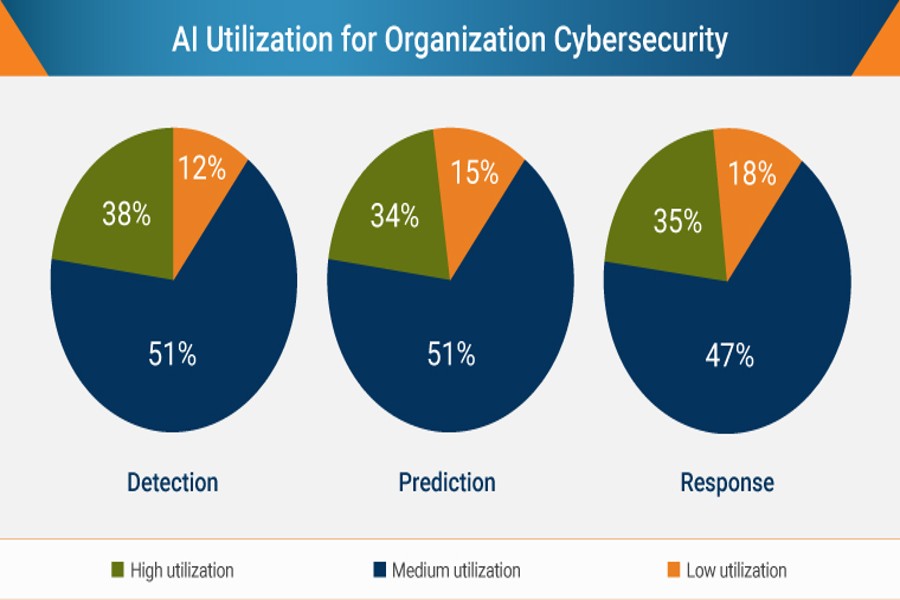Artificial Intelligence in Cybersecurity
Artificial Intelligence (AI)
The study of imitating human intelligence in computers with the aim of making them think and behave like humans is known as artificial intelligence (AI). This would enable AI computers to carry out jobs that were previously limited to human performance. AI might even be more efficient than humans at some tasks. A lot of AI systems try to figure out how to solve a problem or get the desired result. They usually accomplish this by first examining vast volumes of training data, after which they look for patterns in the data that they can use to inform their own decisions.
How AI Benefits Cybersecurity
Virtually every business is changing due to artificial intelligence (AI), and cybersecurity is no exception. According to a recent study, the market for cybersecurity products based on artificial intelligence is expected to grow from $15 billion in 2021 to $135 billion by 2030. In addition to more conventional technologies like antivirus protection, fraud detection, data loss prevention, identity and access management, intrusion detection, risk management, and other essential security areas, cybersecurity companies are depending more and more on AI. Due to AI’s ability to scan through massive amounts of data and identify patterns, it is particularly well-suited for activities like:
- Identifying true threats with greater accuracy than human detection, producing fewer false-positive findings, and allocating priority to responses according to their practical hazards;
- Recognizing and marking as suspicious the kinds of emails and messages that are frequently used in phishing attacks;
- Security teams can identify possible weaknesses before cybercriminals can by simulating social engineering attacks.
- They can also quickly analyze vast amounts of incident-related data and take immediate action to contain the threat.
Furthermore, AI has the ability to revolutionize penetration testing by purposefully probing software and network defenses to find vulnerabilities. Organizations will be better equipped to recognize their vulnerabilities before malevolent hackers can take advantage of them by using AI tools that are specifically targeted at their own technology. Having this information would provide cybersecurity companies a big advantage in thwarting assaults in the future. Preventing breaches would help save organizations’ IT expenses while also protecting the data of both individuals and companies.
How Hackers Abuse AI
Regretfully, cybercriminals are resourceful and unrelenting. Let’s examine a few of the ways they profit from AI for themselves:
Social Engineering: These scams use psychological manipulation to fool people into disclosing private information or committing other security blunders. They cover a wide range of categories of fraudulent activities, such as business email compromise scams, vishing, and phishing.
Cybercriminals can utilize AI to automate a lot of the procedures used in social-engineering assaults and to produce more sophisticated, targeted, and convincing messages that trick unsuspecting victims. Because of this, fraudsters may launch more assaults in a shorter amount of time and have a higher success rate.
Password hacking: Cybercriminals use artificial intelligence (AI) to enhance the algorithms they employ to crack passwords. Hackers can now guess passwords more quickly and accurately thanks to the improved algorithms, which also increase their efficiency and profitability. Cybercriminals may use this as an excuse to emphasize password hacking even more.
Deepfakes: This kind of trickery takes use of AI’s ease with which it may alter audio or visual content to appear authentic. This includes impersonating someone else using fake audio and video. In a matter of seconds, the manipulated content can be widely shared online, often on well-known social media sites, causing viewers to feel anxious, scared, or confused. Deepfakes can be used by cybercriminals in conjunction with extortion, social engineering, and other kinds of schemes.
Poisoning Data: An AI algorithm’s training data can be “poisoned” by hackers, who change it to affect the algorithm’s final judgments. Put simply, false information is being fed into the system, and poor input results in poor output. Furthermore, it might be challenging and time-consuming to identify data poisoning. Therefore, the harm may already be significant when it is discovered.
Staying Secure in a Changing AI Environment
Concerns over risk management and data privacy for individuals and enterprises are only going to increase as AI develops. Regulators are thinking about how to advance AI and optimize its positive effects while lowering the possibility of detrimental effects on society. Nevertheless, the US does not currently have any comprehensive federal legislation pertaining to AI.
What does this all mean to you, then? In what ways do the developments in AI affect your life in terms of security?
Thankfully, the solution is fairly easy. It is not necessary for you to acquire new cybersecurity guidelines. Rather, you should assess the cybersecurity protection you now have in place and ensure that it complies with best practices in important areas like data privacy, passwords, personal cybersecurity, and social engineering in particular.
As usual, it’s a good idea to check our Security Center frequently for updates on AI and our most recent cybersecurity advice. It is easier for all of us to take use of the conveniences and other improvements in our daily lives that AI has made available by remaining safe.
Reference:
- https://www.morganstanley.com/articles/ai-cybersecurity-new-era
- https://readwrite.com/the-future-of-ai-in-cyber-security-testing-unlock-the-potential/

